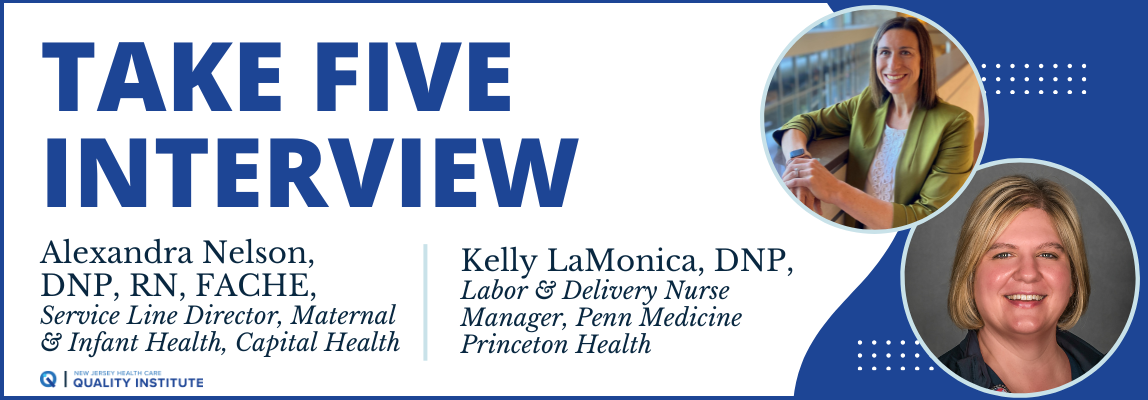Alexandra Nelson, DNP, RN, FACHE, Service Line Director, Maternal & Infant Health, Capital Health, a member of the Quality Institute’s Provider Council System Level.
Kelly LaMonica, DNP, Labor and Delivery Nurse Manager at Penn Medicine Princeton Health, a member of the Quality Institute’s Provider Council.
What motivated your hospital to join the Raising the Bar for Maternal Health Equity and Excellence initiative?
Nelson: Raising the Bar looks to address a critical issue in the community we serve and aligns with so much of our work that it was a natural fit for us. As a partner in First Lady Tammy Murphy’s Nurture NJ initiative, we have many things in development to help improve birth equity and maternal child outcomes for the people giving birth in our community. The Raising the Bar pilot is an important part of that. We recognize the importance of community involvement in these efforts and the value of patient voices, so the creation of the PCAB and launch of Team Birth were big draws for us.
LaMonica: I heard someone from Ariadne Labs talk at a conference about TeamBirth and later I learned we could bring TeamBirth here as part of Raising the Bar. We learned more about all aspects of Raising the Bar and thought the entire initiative could have a powerful impact in our community.
How did you secure buy-in from senior leadership and other key stakeholders to participate in the RTB initiative?
Nelson: This was an easy ask of senior leadership, given the important area of focus and the relationship we already have with the Quality Institute. They were extremely supportive. Our Quality department frequently participates in quality and safety collaboratives as a way of exploring best practices, so it was a natural extension of those other efforts. As for our clinicians, this was enhancing work we are already doing so it was easy for them to embrace.
LaMonica: Penn is supportive of anything that’s going to improve patient safety and quality. We brought the initiative to the Chief Nursing Officer and the Chief Executive Officer and both were on board. The buy-in was easy also when people understood we would be working closely with the Quality Institute.
What insights and value did the maternal health benchmarking activity, a part of Raising the Bar, bring to your efforts to continually improve care?
Nelson: The benchmarking survey provided us with an unbiased report that supported things we were already thinking. In fact, it gave us more evidence to support bringing ideas forward. We have some good evidence-informed best practices in place, but the benchmarking helped identify additional opportunities to support our maternal population. For instance, we learned more about the languages our patients speak, and it helped identify ways we can meet the needs of our community through more inclusive materials and translation programs.
LaMonica: For one thing, the benchmarking brought to light the need to stratify our data by race. It’s a lot of work for the Performance Improvement team, with limited staff. But once we had the benchmarking survey it was easy to say, “Hey, we need to do this.” And the benchmarking survey also highlighted areas such as maternal mental health, a big challenge for everyone and something we all need to improve upon … the benchmarking helped a lot and so we’re working on that for sure.
Why was it important for your hospital to establish a Perinatal Community Advisory Board (PCAB), and what impact has the PCAB had so far?
Nelson: At Capital Health, we have a hospital-wide patient advisory board, but with such a broad focus it can be a challenge to dig deep into a single service line. Maternity is a small subset of all the potential things they might discuss. The Perinatal Community Advisory Board is a more focused opportunity to obtain input that is pertinent to new parents and people who are pregnant. The board has already had an impact, helping us update how we educate our new moms. They also gave us insight into the experience they had giving birth and helped us design materials that were more patient facing.
LaMonica: It’s eye-opening to have patients involved. We think we know what patients want, but not always. Here’s a simple thing. We had dietary asking patients if they wanted a tray for their husband. But the significant other is not always a husband. That was a simple change. The work of the PCAB has been amazing. There may be things that you don’t always realize are happening. It’s a lot of work putting it all together, but having the Quality Institute help us develop the PCAB enabled us to make it happen.
How will you sustain the PCAB and ensure that community voice remains integrated into your hospital’s maternal health work beyond the initiative?
Nelson: Capital Health leaders saw the success of the Perinatal Community Advisory Board and built the development of additional subspecialty advisory boards into our new strategic plan. The organization has really bought into the concept and importance of these subspeciality patient experience advisory boards and is focused now on where best to add our next one.
LaMonica: We will be accountable to continue the initiative because we’ve seen such a benefit. The hospital leadership has been very involved in Raising the Bar and the Perinatal Advisory Board, and we will continue because we know the value and the good work of this initiative.

